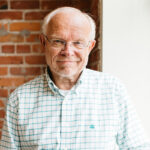If you’re like me, there are times in your life when Scripture felt like it leapt from the page straight into my soul, prayers felt immediately heard, and worship stirred my heart, emotions, and mind. But let’s be honest. There are days when Scripture feels like ink instead of fire, when God feels silent and distant.
When Discouragement Creeps In
Usually, I hear or read words that discourage rather than comfort or console:
- “If you don’t hear God’s voice, guess who isn’t listening?”
- “If you don’t sense God’s touch this day, whose fault is that?”
- “If God doesn’t seem to feel close, guess who moved?”
Where can we turn when Scripture reads like ink? What if we look to one who was a poet, familiar with both ink and papyrus? David was a shepherd boy in a large family. Not always respected by his brothers, David was later called a most peculiar name by Yahweh: He was “a man after God’s own heart.” Words spoken in 1 Samuel 13 after the prophet Samuel gave Saul his pink slip: “You have done foolishly; You have not kept the commandment of the Lord your God, which he commanded you. The Lord would have established your kingdom over Israel forever, but now your kingdom will not continue…”
David’s Honest Cry
One might expect David’s experience with God to be constant, consistent, vibrant, and always aware. What then do we do with Psalm 10:1 (part two of Psalm 9 and 10, attributed to David)? “Why, O Lord, do you stand far off? Why do you hide yourself in times of trouble?” Isn’t that when we “need” God most to be near, present, active, and communicative?
What happened to cause this psalmist-poet-leader to cry out in distress? Life. Hard life, even. In context, Psalm 10 is a cry of lament—echoed a bit by Jesus, “My God, my God, why have you forsaken me?”
God’s Silence Is Not Absence
The longing we feel in such moments is not a sign of failure in your faith. Instead, it may well be a sign of your faith. Only someone who believes, who remembers, who trusts that God can be present, can ache for his presence like that. God’s silence is not God’s absence.
David wrote another Psalm you probably know very well, Psalm 23. The Shepherd who walks beside us in green pastures is the same shepherd who is with the poet as the text says, “even though I walk through the darkest valley.”
A valley can be a place of danger, treachery, trial, uncertainty, and fear. A valley can be a place of spiritual struggle and testing. A dark valley can be a place where one feels isolated, alone, and abandoned.
Deep Roots When God Feels Silent
Our feelings may not be our best measure of God’s presence and intimacy. Sometimes God draws us into a deep place through quietness, which often feels like absence. Like roots that grow unseen, your faith may be deepening without your sense or feelings. You will find strength and new intimacy with God from soil that is actively at work, giving nutrients underground, unseen.
Your faithfulness is expressed precisely in times when you seek without finding immediate growth, presence, or voice. You are obedient as you seek and listen so very deeply for the Spirit’s whisper within.
Practicing Faithfulness When God Feels Silent
What then do we do as we continue to practice faithfulness in such seasons? What might the Spirit want us to understand about God?
- We can pray anyway. I start each morning with a simple sentence of awareness—an old Jewish prayer, “Blessed are you, Lord our God, king of the universe.” And, “this is the day the Lord has made…” I love you: Be rooted.
- We can pray honestly. Tell God what we feel in raw, unpolished words. Express your longing for God without artifice or pretense. I am listening: Be truthful.
- We can borrow vitality from the prayers of others. In worship, devotional reading, mentoring, and spiritual friendship. We are the body of Christ, together, not alone. We form the symphony of God’s people in worship, song, prayer, and liturgy. I played a baritone horn in middle school band. Our section often had moments when the music instructed us to “rest,” sometimes a “whole” rest and sometimes as brief as an eighth or sixteenth. In those moments, other sections of the orchestra were on center stage until it was our turn to re-enter the composition. Rest is a moment of anticipation, waiting. So, lean on the community, the orchestra of faith, as you wait, as you rest. I am listening: Be connected.
- We can rest in the promise of Jesus. In Matthew 28: “Surely, I am with you always, to the very end of the age.” Always includes now. Always includes those times when your prayers seem to fall from your heart straight to the floor, when your worship feels more like a memory than a song, when your soul longs for more. Always includes now, here, even in moments when God is quiet. I am present: Be assured.
- We can spend time with David. His psalms are filled with questions, laments, tears, cries of abandonment, and confession. His life wasn’t perfect. His life wasn’t an unbroken emotion of presence. As someone has written, “When David stumbled, he stumbled toward God. When he sinned, he confessed. When he doubted, he prayed. When he felt abandoned, he cried out all the louder. But, in all things, trembling faith or triumphal joy, David pursued God who welcomed the honesty of his prayers and the seeking of his heart.” I am welcoming: Be honest.
Honest Faith, Not Perfect Faith
I don’t know if all of us can be “a man or woman after God’s own heart” as was David. But I know that God’s presence is not a reward but a gift; it is not evidence of perfect faith but of honest faith; it is not a singular expression of our spiritual maturity, but a sign of one who can pray as did the father who came to Jesus, “Lord, I believe, help thou my unbelief.” I am with you: Be bold.
Practice: Simply, stay the course when the words of Scripture read like ink and not fire; when God feels silent and seems more absent than present, stay the course.
Practice for Mentors: Invite those you meet with to name a time when God felt silent in their life. Encourage them to share what they felt, thought, or prayed during that season. Listen without rushing to fix or explain. Then together, read Psalm 23 or Psalm 10 and ask: What word or phrase stands out to you today?
_______________________________

Keith Anderson, D.Min., is a Faculty Associate for Spirituality and Vocation at VantagePoint3 and President Emeritus of Seattle School of Theology and Psychology. He is the author of several books, including his most recent: On Holy Ground: Your Story of Identity, Belonging and Sacred Purpose (Wipf & Stock, 2024). His other works include Reading Your Life’s Story (IVP, 2016), A Spirituality of Listening (IVP, 2016), and Spiritual Mentoring (IVP, 1999). In his writing, teaching, and mentoring, Keith seeks to set a table for people looking to enter the “amazing inner sanctuary of the soul” in the most ordinary and extraordinary moments of life.

